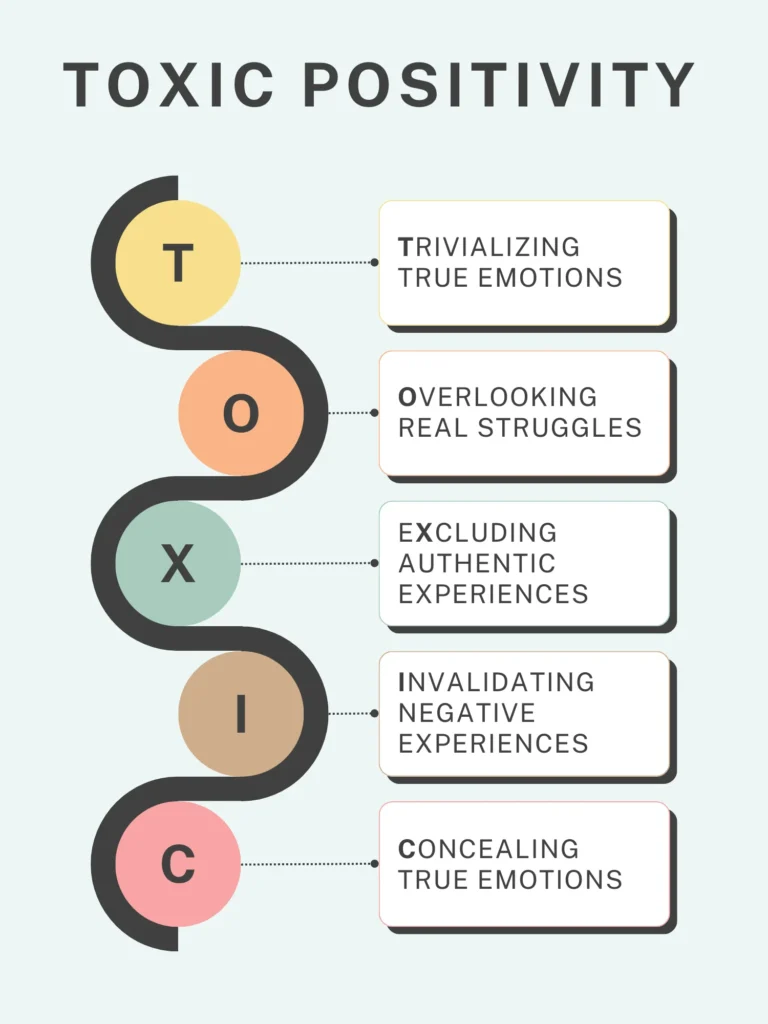Positivity is an essential part of emotional well-being, but is it possible to be too positive? Toxic positivity is a growing concern in today’s world, and it involves the suppression of negative emotions in favor of a relentless pursuit of positivity. It can be challenging to identify toxic positivity, but it’s critical to understand the potential negative consequences that can arise from an unhealthy level of positivity. In this article, we will delve into: toxic positivity signs, the negative effects of toxic positivity on mental health and overcoming toxic positivity.
What is Toxic Positivity?
When you hear the term “toxic positivity,” you might assume that it refers to being too optimistic. However, unhelathy positivity involves more than just having a positive outlook on life. It’s an attitude that suppresses negative emotions and focuses solely on positive thinking, even in situations where acknowledging difficult emotions may be healthier.
This can ultimately lead to an unhealthy denial of your feelings, experiences, and struggles, causing undue stress and anxiety. Unhealthy positivity does not leave room for authentic and vulnerable expressions of emotions.
It’s important to understand that toxic positivity is not the same as genuine positivity. A positive attitude that acknowledges and accepts the full range of emotions, both positive and negative, is healthy. Toxic positivity, on the other hand, tries to dismiss and invalidate negative emotions while overemphasizing happiness and positivity.
Signs of Toxic Positivity
In our journey to understand and address toxic positivity, it’s crucial to delve deeper into the subtle signs and behaviors that often accompany this phenomenon. Recognizing toxic positivity can be challenging, especially when it masquerades as genuine encouragement or optimism. Here are some additional insights into the signs of toxic positivity:

Denial of negative emotions
When positivity becomes a facade, individuals may deny or suppress genuine negative emotions. This superficial approach to positivity can hinder authentic self-expression.
Aversion to Vulnerability
Those practicing unhealthy positivity may shy away from acknowledging vulnerability or addressing difficult emotions, preferring instead to emphasize an unwavering positive facade.
Unwarranted Optimism in All Situations
Toxic positivity may manifest as an insistence on maintaining a positive outlook at all costs, even when faced with challenging or distressing circumstances. This can lead to the invalidation of the complexity of human emotions.
Overly simplistic advice
Unhelathy positivity often resorts to providing overly simplistic advice, such as “just be happy” or “look on the bright side,” without acknowledging the complexity of individual struggles. This can trivialize genuine emotions and diminish the human experience.
If you notice any of these behaviors, it may be a sign of toxic positivity in yourself or others. Take the time to reflect on your emotions and acknowledge the validity of negative experiences. Remember that it’s okay to not be okay, and seeking help is a healthy and important step towards mental wellbeing.
The Negative Effects of Toxic Positivity
While positivity is often touted as the solution to all problems, toxic positivity can have detrimental effects on your mental health. Suppressing negative emotions can lead to increased stress and anxiety. Denying your feelings may cause them to fester, leading to a buildup of emotions that eventually culminate in a breakdown. Additionally, being told to “just stay positive” when you’re struggling can make you feel like your emotions are invalid or that you shouldn’t feel the way you do.
“In a Science of People study, 67.8% of respondents said they experienced toxic positivity from someone in the past week.” – Forbes
Mental health is complex, and the pressure to maintain constant positivity can lead to a disconnection from authentic emotions. By perpetuating the myth that good mental health equates to being happy and positive all the time, unhealthy positivity puts undue pressure on individuals to ignore their struggles and maintain an unrealistic façade of positivity.
Nurturing Mental Health: Self-Care and Authenticity
Self-care is an essential practice in overcoming toxic positivity. It involves prioritizing your emotional and physical well-being by engaging in activities that promote relaxation, mindfulness, and connection with your inner self. By taking time to care for yourself, you create a space for genuine well-being and promote authenticity in your daily life.
Some effective self-care practices include meditation, journaling, spending time in nature, and engaging in creative activities. You can also nurture your mental health through regular exercise, a healthy diet, and self-reflection. Learning to identify and tune in to your emotions is also an important aspect of self-care, as it promotes emotional intelligence and self-awareness.
Practicing self-care also involves setting healthy boundaries and saying no to activities or relationships that do not align with your values and goals. By putting yourself first and being true to yourself, you can create a sense of authenticity that combats the pressure of unhealthy positivity.
Remember, self-care is not selfish—it is essential for maintaining a healthy mindset and preventing burnout. By prioritizing your well-being and nurturing your mental health, you can create a foundation for genuine positivity and a more fulfilling life.
The Connection Between Toxic Positivity and Mental Health
Toxic positivity can have a profound impact on our mental health. The pressure to maintain a positive outlook on life and suppress negative emotions can lead to feelings of invalidation, denial, and anxiety. Moreover, societal expectations of constantly being happy and optimistic can be exhausting, ultimately causing burnout. It’s essential to recognize that negativity is a normal part of the human experience and that suppressing it is not a healthy coping mechanism.
“Toxic positivity perpetuates the myth that emotions are bad and should be ignored, stifled, or silenced.”
Lisa Olivera
Studies have suggested that toxic positivity can contribute to higher levels of stress, decreased well-being, and a higher risk of mental health issues such as depression and anxiety. However, by acknowledging and validating challenging emotions, individuals can foster genuine positivity that leads to greater resilience and personal growth.
Combatting unhealthy positivity requires a holistic approach that acknowledges the importance of self-care, mindfulness, and authenticity. Learning to practice self-compassion and expressing emotions authentically can help individuals navigate difficult situations and build meaningful relationships.
Toxic positivity is a pervasive issue in society, with implications on various aspects of life. It’s essential to recognize the signs of unhealthy positivity and learn how to foster genuine positivity that aligns with mental health.
Conclusion
Now that you have a better understanding of toxic positivity, it’s essential to find a balance between encouragement and unhealthy positivity. Remember, suppressing negative emotions and denying their existence can have negative impacts on your mental health.
Identifying the signs of toxic positivity can be challenging, but it’s crucial to acknowledge and validate your emotions. Don’t let societal pressure or expectations influence your thinking, and always seek help when needed.
Creating a supportive work environment and nurturing relationships based on empathy and open communication is vital. Remember, authenticity is key in combatting unhealthy positivity and promoting genuine well-being.
Sources:
Psychology Today, https://www.psychologytoday.com/us/basics/toxic-positivity
Forbes, https://www.forbes.com/sites/forbeshumanresourcescouncil/2022/08/10/the-rise-of-toxic-positivity
Science of People, https://www.scienceofpeople.com/toxic-positivity/



